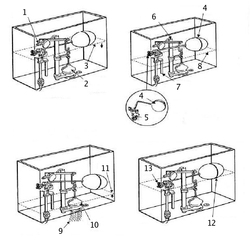Materialists say that it’s the matter that’s conscious, stupid, and laugh at the myth of “ghosts in the machine”. However that commits them to a strange view of matter. The physical properties of all instances of an elementary particle are identical. But some, a tiny proportion, support consciousness, by mechanisms not yet elucidated but, it is assumed, following the standard models of natural law. So all elementary particles (or possibly all particles of a particular common type; it may be the electrons or the protons) are consciousness-capable. If not, the materialist answer to the “what substance?” question is handwaving.
I always return to Richard Hofstadter, who in his book, I Am A Strange Loop, came up with some fascinating metaphors for consciousness, based both on what we know as well as what we might infer (and a good deal of pure speculation).
But he had a system he called the Hunecker scale, which measured consciousness, based on the principle that consciousness is ultimately about a series of feedback loops. One on the scale would be the simple mechanism of a toilet ballast which, sensitive to the amount of water filling up in the tank, receives feedback and stops the water flow. At the other end of the scale would be a sort of omnipotence, in which all future possible events are known. Humans would land somewhere in between, with lower forms of life occupying places further down the scale.
One of the things I like about this is that it seems to illustrate just this sort of gap between the material activity of the physical world and the elusiveness of consciousness. (Hofstadter spends considerable time in the book exploring different ways thinking about this problem.) I’ve always been struck by how ridiculously mechanistic people tend to be. Maybe it was the acid I took in my youth, but I’ve always felt we tend to anthropomorphize people too much.
So animal-like, we are mostly the only self-aware creatures on the planet. But this fact of supposed self-awareness seems only marginal to the larger complexity of our brain, the rest of which we have in common with most mammals, etc. I say “supposed” because in reality we aren’t very self-aware at all. Mostly we are incredibly un-self-aware, most of the time. And yet this tantalizing illusion that we are little Gods walking around thinking ourselves original, responsible and all the rest, this or that behavior somehow designed by us, that we are somehow in control of our lives, is such an – ironically – ego-feeding enterprise that we just can’t seem to quit it.
Yet as best as I can tell, this little ego-box in which we fly, strapped to fate no less than Mitt Romney’s crated Irish setter, is only along for the ride, pretending to run the show instead of merely enjoying it. Animals without much self-awareness surely experience all the same qualias. Yet what kind of consciousness do we assume in them? And as we travel down the brain-chain, what do we see but decreasing neural complexity? Hunecker after hunecker, myriad network dynamics shrink until we reach creatures that could hardly be described as thinking at all. Rather, they are mechanisms.
Apparently the enlightenment didn’t kill God, but merely made him human. An ironic reversal indeed. He ought to be finished off entirely.

No comments:
Post a Comment